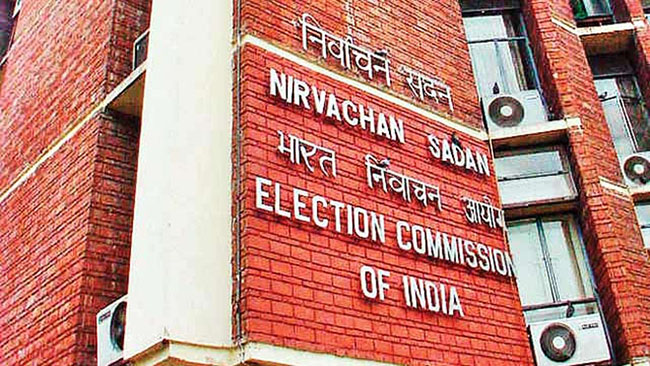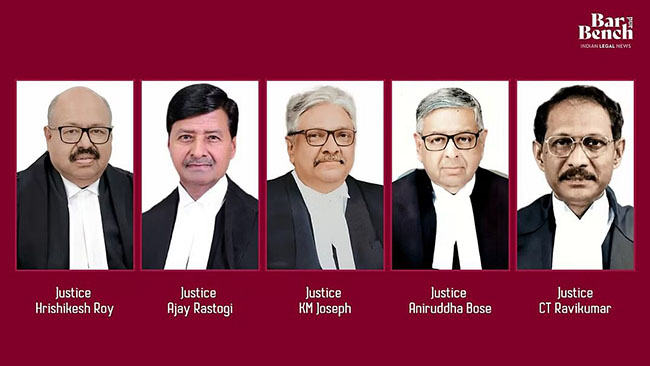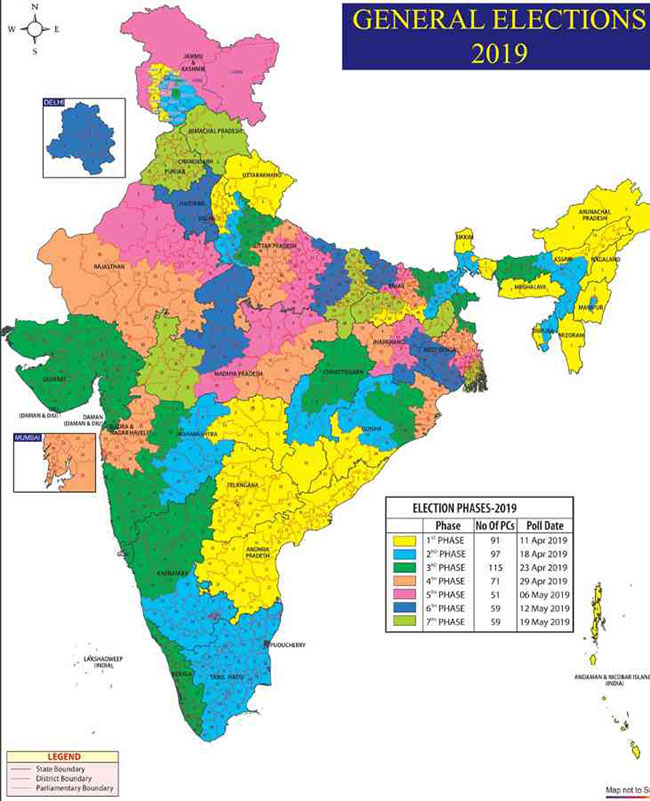Supreme Court verdict on ECI appointments
By Philip Mudartha
Bellevision Media Network
04 Mar 2023:
Synopsis:
Supreme Court has done what successive governments shied away from. Selection of CEC and ECs by government was problematic. With weighty decisions on conducting elections and adjudicating disputes between parties to be made by this high constitutional office, election commissioner selection is best taken out of Executive’s hands.

A five-judge bench of the Supreme Court Thursday, 2nd March 2023, unanimously ruled that a high-power committee consisting of the Prime Minister, Leader of Opposition in Lok Sabha, and the Chief Justice of India must pick the Chief Election Commissioner (CEC) and Election Commissioners (ECs). What was the challenge before the Court and why did it radically alter the process of appointing Election Commissioners?
On May 17, 2021, the Association for Democratic Reforms (ADR) in public interest had filed a writ petition under Article 32 of the Constitution challenging the constitutional validity of the mode of appointment of the chief election commissioner and election commissioners by the Government of India.
As per the current process, the Law Minister suggests a pool of suitable candidates to the Prime Minister for consideration. The President makes the appointment on the advice of the PM.
After due to constitutional debates, the SC order held that the current process of appointment of CEC and ECs by the executive without any consultation or concurrence of other entities was violates Article 14 (equality before law) and Article 324(2) which mandates Parliament to make a just, fair and reasonable law for appointment of members of the Election Commission of India (ECI).
It was felt that such an appointment weakens the institutional apparatus and hence there was a need to insulate the system against political and/or executive interference. In the petition, ADR sought an appropriate order or direction for constitution of a neutral and independent collegium/selection committee to recommend names for appointment of members of the ECI.
A Big Electoral Reform
This was on the lines of the recommendations of the Law Commission’s 255th Report of March 2015, the Second Administrative Reforms Commission in its fourth Report of January 2007, the Dinesh Goswami Committee Report of May 1990, and Justice Tarkunde Committee Report of 1975.
The landmark judgment of March 2 by a five-member Constitution bench of Supreme Court has ruled that the selection of members of the ECI would be done by a Committee comprising the Prime Minister, the Leader of Opposition or in his/her absence, leader of the largest opposition party in the Parliament, and the Chief Justice of India. This system will be in vogue till the Parliament makes a law in this regard.

Why this change in the selection procedure was necessary is borne out by the way certain decisions were taken by the ECI over the last few years and the manner in which members were appointed by the Government. Successive Governments since the 1950s have failed to enact a law and the appointment of the CEC and ECs was done solely by the Executive. This was incompatible with Article 324(2) and hence arbitrary. Recommendations of various committees as mentioned above were studiously ignored by all Governments.
Perception Matters
Democracy is a facet of the basic structure of the Constitution and in order to ensure free and fair elections and to maintain healthy democracy in our country, the ECI should be insulated from political and or Executive interference. The ECI is not only responsible for conducting free and fair elections but it also renders a quasi-judicial function when disputes arise between various political parties including the ruling party in government and other parties.
Hence the perception amongst the voters, political parties and others about the ECI must be that it is non-partisan, impartial, independent and insulated from interference by the Executive, and is a fair constitutional body. This perception had unfortunately taken a beating over the last few years.
In March 2021, the Citizens Committee on Elections (CCE) chaired by retired SC judge Madan Lokur examined the 2019 general elections and gave the following observations:
ECI deliberately delayed the announcement of elections to enable the ruling BJP and Pm to inaugurate 157 projects between February 8 and March 9 of 2019.

Further, the 2019 elections were the longest in the country’s history. The election schedules were drawn up to facilitate the PM to criss-cross the country to campaign, thus giving the ruling BJP an unfair advantage.
1. There was lack of consistency by the ECI in enforcing the Model Code of Conduct and a perception of ECI treating the ruling BJP with kid gloves thus disturbing the level playing field.
2. The Election Commissioner who dissented and stood his ground was eased out from the ECI.
3. Another disturbing phenomena was the abuse/ misuse of armed forces for election propaganda. This caused anger among the veterans and they wrote to the President but received no response.
When Executive Discretion Ends
The SC judgment will satisfy the ECI too as over the last many years various CECs have been demanding security of tenure. As per the Constitution, the tenure should be 6 years and retirement at 65 years. However if we examine the tenure duration of last few CECs since Dr Nasim Zaidi, the tenures have been: Zaidi 4 years 10 months, Joti 2 years 8 months, Rawat 3 years 3 months, Arora 3 years 7 months, and Sushil Chandra 3 years 3 months. For security of tenure now the same rules are applicable for the ECs as for the CEC.
The SC also questioned the Government about the lightning speed at which Arun Goel was appointed EC after he sought voluntary retirement, which was accepted, file cleared and he was appointed EC, all within 24 hours to fill a vacancy. All this happened while the SC was hearing the case.
Though criticism of the ECI by political parties may still continue, they will lose their moral authority as they too will have a say in the appointment of the ECs in future. Whether the new selection procedure will improve the functioning of the ECI remains to be seen as ultimately it depends on the integrity of the person occupying the chair. However it is hoped that with the new process of appointment coming into force, the perception about the ECI will change for the better.
Reactions:
All former CECs welcomed the SC judgment. The opposition parties too welcomed the order. They, however expressed apprehensions that the ruling BJP under PM Modi may try and bull-doze the parliamentary opposition using its majority to enact a law to undo the SC order.
Congress party is the largest opposition and hence, in the absence of LoP, its Leader in the Lok Sabha will be a member of the SC committee empowered to make future ECI appointments. Hence, it called for the immediate resignations of incumbent CEC and ECs and pave the way for fresh appointments as per the process laid down by the SC order. It is unlikely the ruling BJP will heed to its demands.
Conclusion:
Is the ruling a Game Changer? There is no straightforward answer to this question. Nonetheless, this decision will irritate the incumbent BJP administration. This government, to which institutional autonomy is anathema, will leave no stone unturned in its efforts to circumvent the SC ruling. It can do the following to maintain its role in the appointment of election commission members:
First, the government will implement this verdict without bringing any legislative measures to alter or overturn the Supreme Court’s decision. In this instance, the government has the CBI director or Lokpal appointment model with same panel members as in this case, where the government advance the names from a pool of favourable officers for the selection. So, anyone selected will do the job.
Second, as the constitution gives parliament the ultimate authority to formulate and regulate the service conditions of electoral commissioners, the government will likely introduce a bill to either reverse the decision or, more likely, alter the panel’s composition in its favour. As is the case with almost all bodies, such as the National Human Rights Commission (NHRC) and the Central Information Commissioner (CIC), among others.
Modi brooks no opposition. Under him, all institutions which are vanguards of our democratic polity are made to toe his line. Favourable bureaucrats, judges and other government servants are rewarded with plum official postings such as ambassadors, governors, Rajya Sabha members etc.
He may see that the ECI succumbs to his diktat.
 Write Comment |
Write Comment |  E-Mail To a Friend |
E-Mail To a Friend |
 Facebook |
Facebook |
 Twitter |
Twitter |
 Print
Print 


















